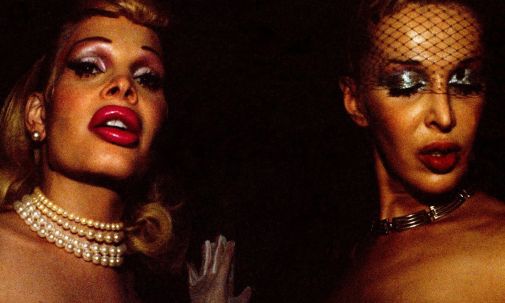By Glenn Dunks

LGBTIA people of colour are seen far less on our screens so I wanted to use this week’s column to focus on a few films that give them a spotlight which are now accessible to audiences. Of the three titles, the one that feels the most urgent is Graham Kolbeins’ exuberant Queer Japan that traverses the (often quite interconnected) underground scene of Japan’s queer population. If Kolbein’s film is vibrant and busy, then Gustávo Sanchez’s transgender narrative of I Hate New York manages to somehow find the grit and the dirt in NYC long after it seemingly vanished. Lastly, while that city’s Harlem ball scene has been well memorialized on screen, Deep in Vogue by Dennis Keighron-Foster and Amy Watson finds a different angle across the pond in England’s scene...

Queer Japan begins like director Kolbeins (a Canadian) took a shot of energy drink. And then never stopped drinking. This bright and colourful documentary about gay neighbourhoods and districts of Japan is like a bolt of neon electricity as Kolbeins explores LGBTQ culture in Japan with an inquisitive eye for the outrageous. He jumps around from lesbian bars, gay erotic manga art, rubber artists, drag queens, transgender politicians, activism, AIDS and safe sex campaigners, fetish and kink players, and much more including one joke about fisting that had me howling (you can't say that very often about documentaries!)
Is Kolbeins a cultural interloper? Probably, sure — I don’t know his background. But that doesn’t mean his film isn’t full of eye-opening examples of the ‘hentai’ life that I assume many viewers won’t have been exposed to. Queer Japan justifies its name in the old fashioned sense, but makes the argument that it wouldn’t be ‘queer’ if society wasn’t so rigid in its ideas about sexuality (one subject notes that transgender, fluid non-conforming individuals were once extremely commons in earlier dynasties before the influence of Christianity). But while it is tinged with sadness at the realities of being a minority in contemporary Japan, Kolbeins (who also edited and co-shot with John Roney) fills his film with exciting imagery, every inch of the screen bursting with colour and light. It’s exciting and, yes, a little strange, but certainly never dull and hasn’t an ounce of shame in its brisk 100-minute frame.

Less visually entrancing but full of personalities of strength and potency is I Hate New York. Filmed over many years, Gustavo Sánchez’s doc follows four transgender individuals as they blaze a trail through the East Village’s fading queer underground scene where club kids once reigned. Most famous of them all is Amanda Lepore who has taken her outsized body and commodified it. Beneath her success are stories of pain and the search for identity that are mirrors, albeit in vastly different circumstances, of the doc’s other diverse subjects; Chloe Dzubilo, leader of punk band Transisters; Sophia Lamar, Cuban avant-garde model and actress; and T De Long, rapper and activist whose transition is documented.
It’s a quiet achievement of a film, a defiantly queer rendering of a post-9/11 narrative for the city as these underground heroes attempt to keep their heads above water as the city changes around them (something that Sánchez’s long filming schedule permits us to witness as it happens). It's crudely filmed on home video cameras, but that lack of polish gives I Hate New York the exact kind of grungy aesthetic that a film about this scene calls for. This vision of New York is as a city of shadows, haunted with spirits of the past and present. It’s shows that it’s impossible to truly hate New York City unless you really love it and the subjects of I Hate New York are as good of a reason to keep believing in its magic.

Polish and sheen is something that Deep in Vogue has plenty of, sometimes to its detriment. The strength of Keighron-Foster and Watson’s film is in the way it offers a look into the ballroom culture of Northern England (the title then, taken from Malcolm McLaren’s song, is quite apt). The film is full of beautifully shot sequences of dancing both on stage to rapturous crowds and in artistic stand-alone moments. The film also amplifies this scene’s embrace of transgender men and women, as well as cisgender drag queen and dancers.
However, at only 62 minutes, it doesn't dig deep into the dancers themselves. All of them are undoubtedly fabulous and talented, but I felt as if I learned nothing about them or their journeys. Themes of black disenfranchisement are there, but aren’t lingered on long enough to glean much from. There’s more there that goes unexplored. A bit of the grime of I Hate New York (or, yes, Paris is Burning) would have amplified Deep in Vogue to something more than just an entertainment. But don’t get me wrong, it is very entertaining.
Release: I Hate New York and Deep In Vogue are available through VOD providers. Queer Japan is in virtual theatres from this Friday.